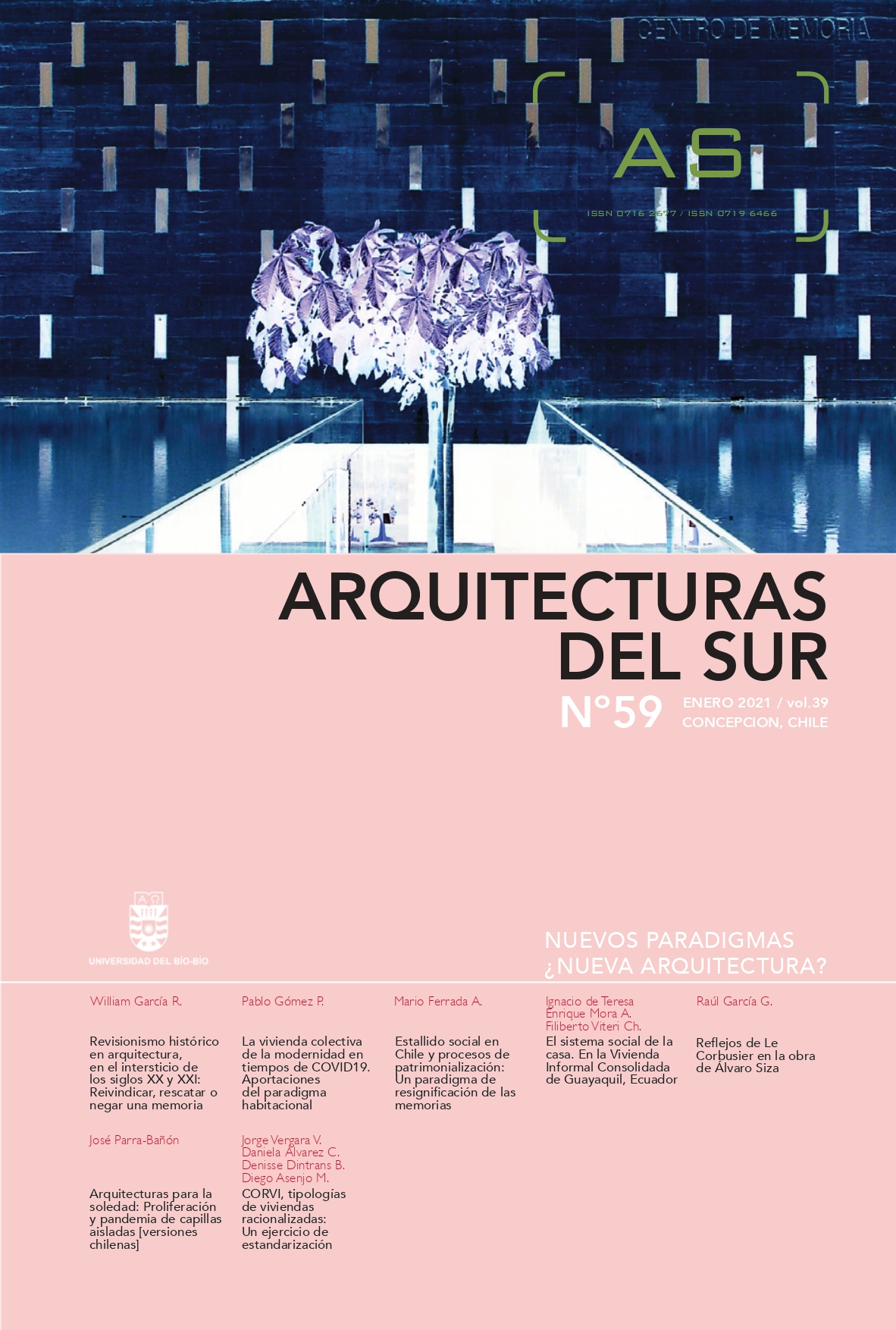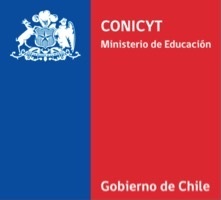El sistema social de la casa. En la vivienda informal consolidada de Guayaquil
DOI:
https://doi.org/10.22320/07196466.2021.39.059.04Palabras clave:
Vivienda informal, transformación social, diseño de sistemas, colectividad, viviendas multifamiliares, objetos multifuncionalesResumen
La crisis post pandémica de la vivienda contemporánea, desencadenada por la COVID-19, no hace sino extender a todo el planeta muchas de las cuestiones en que se hallan inmersas, de manera permanente, las viviendas en continua crisis de los países en desarrollo. ¿Cómo hacer nuestras casas más compartibles, flexibles, transformables, productivas, participativas, habitables, etc.? Por ello, un acercamiento a la vivienda de bajos recursos de estos países permite analizar alternativas a la vivienda actual, que surgen desde la informalidad como respuesta a aquellas preguntas que nos hacemos hoy todos. El siguiente documento describe parte de la investigación llevada a cabo desde la Universidad Católica de Santiago de Guayaquil, que analiza las transformaciones físicas y sociales en la vivienda informal consolidada del centro de la ciudad. Las técnicas que se utilizan incluyen el levantamiento planimétrico de casos de estudio, entrevistas a los usuarios y el mapeo del uso de las viviendas a lo largo del día. El análisis se centra en la interacción que se ejerce entre los diferentes núcleos familiares de la casa y sus objetos, llegando así a describir un sistema de transformación y producción de hábitat ligado a los objetos, en donde la vivienda es entendida como un sistema social de objetos y personas en continua interacción y transformación.
Descargas
Citas
ALLEN, S. (1999). From object to field. Recuperado de: http://lostritto.com/risd2013spring/wp-content/uploads/2013/04/allen1.pdfv.
APPADURAI, A. (1991). La vida social de las cosas. Perspectiva cultural de las mercancías. México: Grijalbo.
BAUDRILLARD, J. (1969). El sistema de los objetos. Madrid: Siglo XXI.
BENJAMIN, W. (2013). La obra de arte en la época de su reproducción mecánica. Madrid: Casimiro.
CHOMBART DE LAUWE, P. (1960) Famille et Habitation. París, CNRS.
DE MOLINA, S. (2013). La invasión de los objetos. Recuperado de: http://www.santiagodemolina.com/2013/01/la-invasion-de-los-objetos.html.
DE MOLINA, S. (2014). Collage y Arquitectura: la forma intrusa en la construcción del proyecto moderno. Sevilla: Recolectores Urbanos.
DE TERESA, I. (2015). Relación entre las características tipológicas funcionales de la vivienda unifamiliar informal y su evolución espacial. Caso: Santa María de las Lomas, Guayaquil. Guayaquil: SINDE, UCSG.
DE TERESA, I. (2016a). Aproximaciones Familia-Casa: la Vivienda Informal Consolidada en Santa María de las Lomas, Guayaquil. Dearq Revista de Arquitectura, (19), 30-43.
DE TERESA, I. (2016b). Transformaciones incrementales en la vivienda informal consolidada: el caso de Santa María de las Lomas, Guayaquil. Arquitecturas del Sur, 34(49), 6-21.
FRIEDMAN, Y. (1999). Structures serving the unpredictable, Barcelona, Nai Publishers.
GARCÍA-HUIDOBRO, F., TUGAS, N. Y TORRES, D. (2008). El tiempo construye. Lima: Gustavo Gili.
HERNÁNDEZ, F., KELLET, P. Y ALLEN, L.K. (2012). Rethinking the Informal City. Critical perspectives from Latin America.Nueva York: Berghahn Books.
IGLESIA, R. (2011). La vida doméstica y los objetos. Buenos Aires: IAA. Recuperado de: http://www.iaa.fadu.uba.ar/publicaciones/critica/0165.pdf
KOOLHAAS, O. (2011). Project Japan. Metabolism Talks. Chicago: Taschen.
LASH, S. (1999). Objetos que juzgan: el parlamento de las cosas de Latour. Recuperado de: http://eipcp.net/transversal/0107/lash/es.
LATOUR, B. (1993). We have never been modern. Cambridge: Harvard University Press.
MOLES, A. (1975). Teoría de los objetos. Barcelona: Gustavo Gili.
MORA, E., Viteri, F. y De Teresa, I. (2017). Estudio de la Generación de Colectividad en la Vivienda Informal Consolidada”. Caso: Santa María de las Lomas, Guayaquil. Guayaquil: SINDE, UCSG.
MORA, E. (2013). Proceso de crecimiento progresivo de las viviendas y su relación con factores y características de cambio en la estructura y dinámica de las familias de menores ingresos. Guayaquil: SINDE, UCSG.
NIEUWENHUYS, C. (2009). La Nueva Babilonia. Barcelona: GG mínima.
ROSLING, H. (2019). Factfulness. Barcelona: Deusto.
TURNER, J. (2017). John Turner: por una autonomía del habitar. Escritos sobre vivienda, autogestión y holismo. Logroño: Pepita de Calabaza Editores.
VENTURI, R. (1978). Complejidad y contradicción en la arquitectura. Barcelona: Gustavo Gili.
WILENSKY, U. Y RESNICK, M. (1999). Thinking in Levels: a Dynamic Systems Approach to Making Sense of the World. Journal of Science Education and Technology, 8(1), 13-19.
Descargas
Publicado
Cómo citar
Número
Sección
Licencia
Derechos de autor 2021 Ignacio de Teresa, Enrique Mora-Alvarado, Filiberto Viteri-Chávez

Esta obra está bajo una licencia internacional Creative Commons Atribución-CompartirIgual 4.0.
El contenido de los artículos que se publican en cada número de Arquitecturas del Sur, es responsabilidad exclusiva de los autores y no representan necesariamente el pensamiento, ni comprometen la opinión de la Universidad del Bío-Bío.
Las/os autoras/es conservarán sus derechos de autoría, sin embargo, garantizarán a la revista el derecho de primera publicación y difusión de su obra. La publicación del artículo en Arquitecturas del Sur está sujeta a la Licencia de Reconocimiento de Creative Commons CC BY-SA que permite a otros Adaptar: remezclar, transformar y construir sobre el material para cualquier propósito, incluso comercialmente, Compartir: copie y redistribuya el material en cualquier medio o formato, siempre y cuando se reconozcan la autoría y la primera publicación en esta revista citando correctamente, así como también sus nuevas creaciones estén bajo una licencia con los mismos términos.













 Programa de Información Científica/Concurso Fondos de Publicación de Revistas Científicas 2018/ Proyecto Mejoramiento de Visibilidad de Revistas UBB (Código:FP180007)
Programa de Información Científica/Concurso Fondos de Publicación de Revistas Científicas 2018/ Proyecto Mejoramiento de Visibilidad de Revistas UBB (Código:FP180007) 
